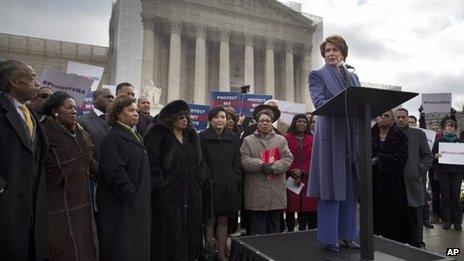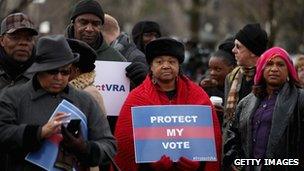US top court hears landmark voting measure challenge
- Published

The top Democrat in the House of Representatives, Nancy Pelosi, spoke at a rally in favour of the law in front of the US Supreme Court
An Alabama county's challenge to a landmark 1965 voting rights law is being heard at the US Supreme Court.
Shelby County says it is no longer necessary to require places with a history of racial discrimination to get approval to modify election laws.
The requirement is part of the Voting Rights Act, extended for 25 years in 2006 with wide bipartisan support.
Questions from conservative justices on the bench suggested the key provision could be in jeopardy, analysts say.
'South more racist?'
The Voting Rights Act, passed at the height of the US civil rights movement, requires strict federal oversight of election laws in nine states, most in the US South, as well as in a few jurisdictions in other states.
Justice Anthony Kennedy, the court's swing vote on many politically charged issues, said during arguments that "times change".
Chief Justice John Roberts asked Solicitor General Donald Verrilli, who represents the Obama administration, whether the administration thought Southerners "are more racist than citizens in the North".
Mr Verrilli replied no.
But other justices asked tough questions of the lawyers representing Shelby County.
Justice Sonia Sotomayor suggested that despite change in the South, Shelby County had not made enough progress.
"Why would we vote in favour of your county, whose enforcement record is the epitome of the reasons that caused this law to be passed in the first place?" she asked.
In its suit challenging the law, Shelby County argues the "dire local conditions" that once justified strict federal oversight of elections no longer exist.

Alabama residents came to Washington DC to protest against changes to the current law
The Obama administration and civil rights groups acknowledge progress in combating discrimination against African Americans and other minority groups, but argue Congress was justified in extending the provision in 2006.
Black voting increases
If the requirement for advance approval were thrown out "it would be hard for us to catch those things up front to make sure that elections are done in an equitable way," President Barack Obama told a radio host, Joe Madison, last week.
The law's supporters say it has been successful because it requires jurisdictions to demonstrate that proposed election law changes will not discriminate.
"It moved the burden from victims to perpetrators,'' said Sherrilyn Ifill, the head of the National Association for the Advancement of Colored People (NAACP) legal defence and educational fund.
Shelby County and several states joining the suit say Congress did not take into account dramatic increases in voter registration and participation by minorities when it agreed to extend the law, nor discrimination problems in places not covered by the requirement.
Their lawyers also argue those who are discriminated against could still file a lawsuit under other provisions of the Voting Rights Act.
Analysts say that after oral arguments the bench appeared to be split evenly, with Justice Kennedy appearing to hold a swing vote on the case and the section of the law in question in jeopardy.
Several justices have already expressed scepticism about the continuing need for the law.
In a similar challenge four years ago, Chief Justice Roberts said the law's past success "is not adequate justification to retain the preclearance requirements".
But the justices sidestepped the question of its constitutionality at the time.
The provision covers Alabama, Alaska, Arizona, Georgia, Louisiana, Mississippi, South Carolina, Texas and Virginia, as well as certain places in California, Florida, Michigan, New York, New Hampshire, North Carolina and South Dakota.
- Published1 October 2012
- Published31 October 2012
- Published3 October 2012